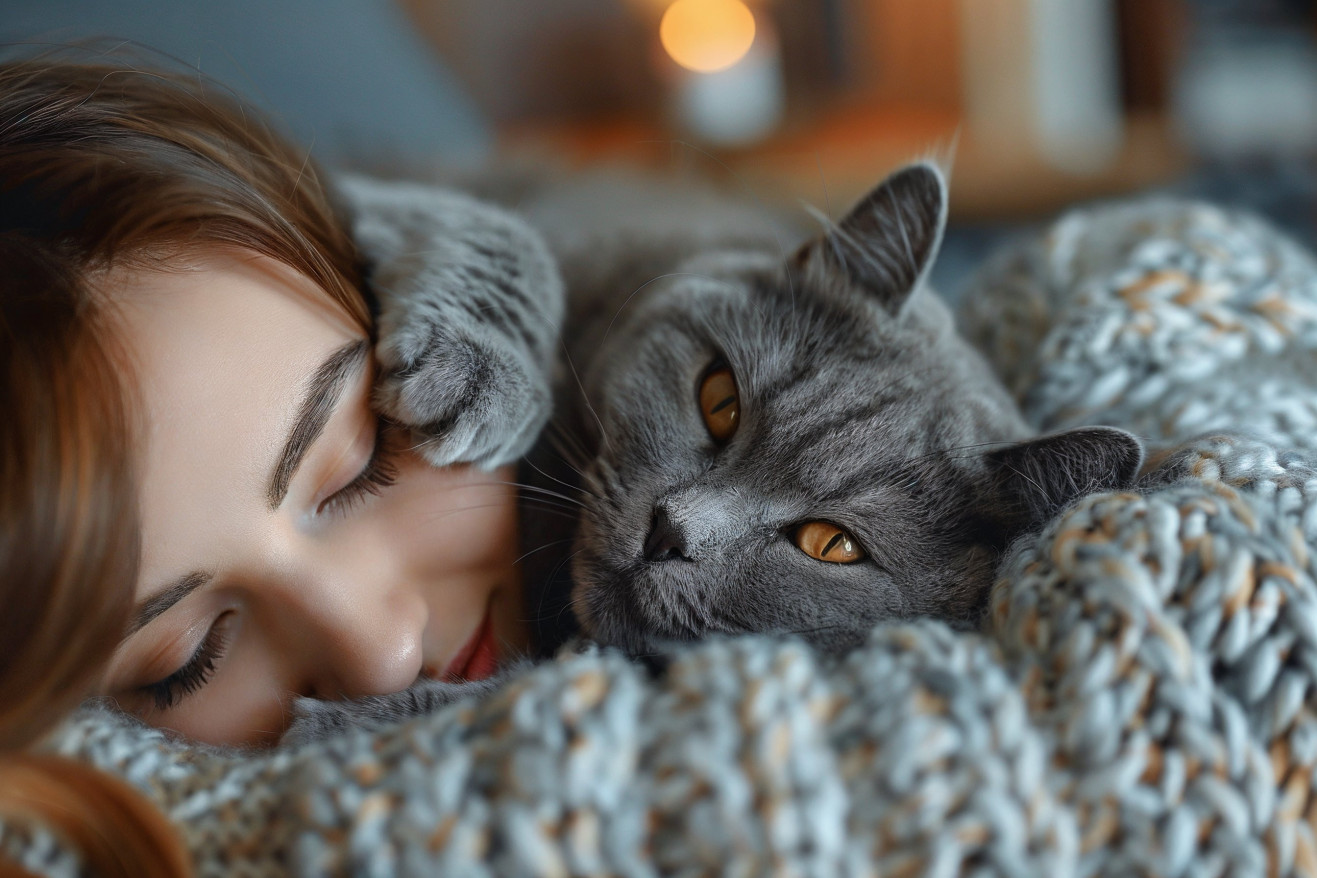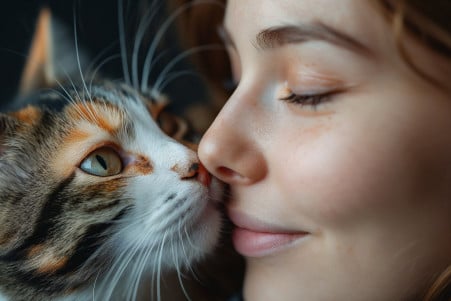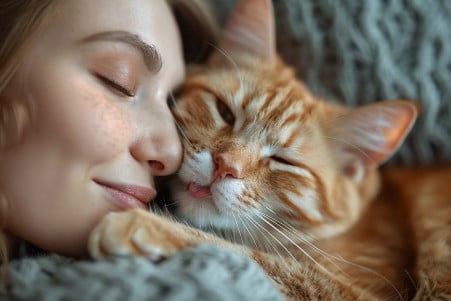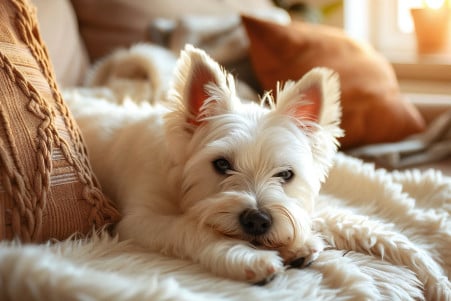Why Does My Cat Lick My Hair? Unraveling Feline Grooming Behaviors
7 March 2024 • Updated 6 March 2024

When your cat licks your hair, are they grooming you, or is there something else going on? While hair licking may be a sign of affection and an attempt to groom you like they would another cat, it may also be that your cat likes the taste of the natural oils or hair products in your hair.
On the other hand, if your cat is licking your hair too much, it may be a sign of an underlying issue like stress or a medical problem.
To help you better understand this strange behavior, we’ve combed through a variety of animal behavior, veterinary, and ethology studies to uncover the many different reasons your cat may be so interested in your hair. By looking at the psychological, social, and physiological factors that influence feline behavior, we hope to offer a well-rounded view of what motivates this grooming behavior and how it affects the relationship between cats and their human family members.
Why does my cat lick my hair?
Social and Hygienic Functions of Cat Grooming
Cats are well-known for their fastidious grooming habits, which are important for both hygiene and social reasons. Cats groom themselves to keep their fur clean, reduce their scent by removing dirt and oils, and to spread their skin oils, which helps keep their fur shiny and healthy.
As the IAABC Foundation Journal explains, grooming is a learned behavior that begins in kittenhood when a mother cat licks her kittens to keep them clean and to stimulate their bodily functions.
Allogrooming, or social grooming, is a behavior seen in many animal species, including cats. As Vetstreet explains, cats tend to groom the head and neck of their ‘preferred associates’ or friends, and this is often extended to their human companions. This behavior can be a sign of affection and a way to mark territory, showing that a cat has accepted a human as part of its social group.
These behaviors are shaped by a combination of genetics and the environment. According to the IAABC Foundation Journal, a cat’s early life experiences and the way resources are divided in its environment can affect its social behavior.
Cats that are well-socialized and have positive experiences with humans early in life are more likely to engage in hair licking as a sign of trust and bonding. So, when a cat licks your hair, it’s not just about keeping you clean—it’s a behavior that’s part of the intricate web of feline social structures and ways of showing affection.
Inside the Mind of Your Cat: Why Do Cats Lick Human Hair?
Cats licking human hair can tell you a lot about their mental state. An article in PMC by Daniel S. Mills explains that cats develop individual relationships with their owners, and these relationships can be expressed through behaviors like licking.
This grooming behavior can be a way for a cat to get attention or provide comfort, showing that they need to relieve stress and want to be affectionate. It can also be a response to stress in the environment, meaning it can be a sign of how a cat is feeling.
An article in Current Biology by Kristyn Vitale shows that the relationship between cats and their owners is more complicated than previously thought, and that cats can have secure attachments to their owners, much like dogs and even human infants.
If a cat is securely attached to its owner, it may be more likely to seek comfort from them through grooming. On the other hand, if a cat is insecurely attached, it may be more likely to compulsively lick hair as a way to cope with anxiety or fear.
For owners who want to have a healthy relationship with their cats, it’s important to understand these complex psychological factors. By acknowledging and working with these psychological factors, owners can better control their cat’s grooming and build a stronger relationship with them.
In Conclusion: What Does It Mean When Cats Lick Human Hair?
While the above studies show that cats’ grooming behaviors are influenced by their social bonds, it’s clear that their individual sensory experiences also play a role. Unlike people, cats don’t have a taste for sweet things—or, more specifically, sweet taste receptors.
A study published in PMC explains that cats don’t have the Tas1r2 gene, which means they can’t taste sweet stimuli. This genetic difference impacts their food choices and may also impact their grooming behaviors, including licking human hair.
On the other hand, cats can’t resist the taste of umami. According to The Jerusalem Post, cats are attracted to the taste of umami, which is found in proteins.
This may explain why they’re attracted to certain scents and tastes in human hair. Since umami compounds are often found in fish like tuna, cats may be attracted to the human scalp, which has natural oils and skin cells that can have a similar taste profile.
Grooming is an important part of a cat’s self-care routine. When cats groom their human owners by licking their hair, it’s clear that the behavior is driven by more than just hygiene. It’s also driven by these complex taste preferences. Knowing this biological detail helps us better understand the feline species and their interactions with people.
Inside the Mind of a Cat: How Cats View Their Human Families
Cats may view their human owners as part of their social group and will often groom them, including licking their hair, to show this. A paper in PMC by Daniel S. Mills explains that the relationship between cats and their owners is social and includes different levels of attachment and affection.
Cats may use licking to help maintain social relationships, and it is a common form of social grooming between cats that are familiar and comfortable with each other.
The Guardian also explains that cats form attachments to their human owners and even show concern for them and seek out their proximity as a way to show their affection. National Geographic agrees, and animal behaviorist John Bradshaw explains that cats probably see humans not as a different species but as part of their social group.
So, when your cat licks your hair, it may be more than just grooming you, it may be a way for it to show its social and emotional connection to you. This demonstrates the complicated and sophisticated nature of the relationship between humans and cats and shows that cats’ social instincts are deeply ingrained.
It’s important for cat owners to understand these social behaviors to ensure a happy and healthy relationship with their furry friends.
Managing the Health Risks of Your Cat’s Hair-Licking Behavior
If your cat is licking hair, you should be aware of the potential health risks to you and your pet. While hair-licking is often a harmless sign of affection, it can also lead to hair ingestion and the subsequent formation of hairballs. Catster warns that long human hair in particular can cause a “drawstring effect” that could lead to life-threatening obstructions in a cat’s digestive tract.
Even more worrisome is pica, a condition in which cats chew and sometimes eat non-food items, including human hair. According to Rover, pica can cause dangerous obstructions in a cat’s intestines that require immediate medical attention. As Rover explains, cat behaviorist Mikel Delgado can help you create an environment that reduces stress and minimizes compulsive behaviors.
If your cat’s hair-licking behavior becomes excessive or compulsive, seek help from a veterinarian. Catster suggests that you ignore your cat when they start licking to avoid reinforcing the behavior.
You can also discourage your cat from licking by using hair products that smell like citrus or providing them with other things to focus on. It’s important to create a low-stress, stimulating environment that allows you to safely and effectively manage your cat’s grooming behavior while promoting the health and well-being of your relationship.
The Whiskered Whims Explained: Why Do Cats Lick Human Hair?
From the sweet social bonding of allogrooming to potential health issues, the reasons cats lick human hair are just as complex as the cats themselves. When it comes to licking human hair, cats are simply extending their allogrooming behavior to their favorite humans. However, there may be a few sensory reasons that cats choose to groom their owners’ hair.
While it’s important to recognize and understand these reasons, it’s also important to remember that these behaviors are part of a healthy, happy relationship with your cat. Cat owners should pay attention to their cats’ grooming behaviors, as changes in these behaviors could be a sign of stress, anxiety, or other issues that may require a veterinarian’s attention.
In the end, let’s appreciate the complexity of cats and the behaviors that make them so lovable. While their grooming behaviors may be confusing at times, they’re also a sign of the rich social and emotional lives that cats lead. So, enjoy the special relationship you have with your cat and continue to pay attention to their needs and behaviors as they delight and confound us with their whiskered whims.


